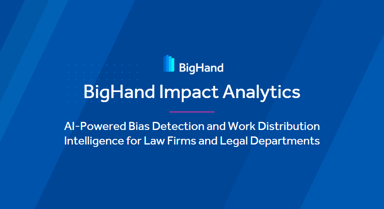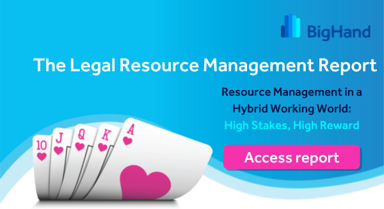Video Transcript:
Milly Parekh
Can you tell us about Kaiser Permanente EID journey and what drove the extension of the EID program?
Tamara Morgan
Hi, Millie, thank you. First, I want to just thank everyone for the honor of being included in this and we are really pleased to have been recognized for our efforts. In the short period of time to talk about our journey, I will try to be succinct.
Kaiser has a long history of commitment to equity, inclusion, and diversity throughout the organization, but it's the leadership and support of our general counsel, Mark Zimmerman, within the Keiser legal Department, that is really taking that commitment and that vision of equity, inclusion, and diversity directly to the legal industry. Our initiative is just a natural progression of what we've been doing for the last 10 years. We've had to build up to this point. We set expectations and started gathering data and embedding EID in our guidelines with outside counsel and our vendor agreements. We've been slowly moving to that point, or it felt like it was very slow, in putting it in our RFPs and just our expectations along the way. And that positioned us to use data to develop this programmatic approach, building on those tools that we already had.
What's different though about what we're doing is an explicit recognition that we, Kaiser and our outside counsel firms, we're shooting for the same target. Often, it seems like when you're in this quest to gather data and meet those diversity goals, it seems like your adversaries in a war, and in fact, we all have shared goals. Our initiative is really very intentionally collaborative with our outside law firms looking at their goals and ours and coming together to partner on how we can move forward based on the data. Sometimes the data that we're able to bring to them is, you know, we're looking at it from a different perspective than they were.
So the pilot has been really well received. The firms have brought innovative solutions to introducing diverse lawyers to the Kaiser team, that align with our business needs. And then we've been involved in talent development plans with their teams. So we think, or we know that we're going to use this type of evidence-based program as a cornerstone of our EDI strategy moving forward because it combines transparency and collaboration and communication and scale in a way that we think will position us to continue to be a leader and propel change in this area.
Milly Parekh
Wonderful. Thank you so much, Tamara, for explaining and providing that insight because you really made a couple of good points. It's the buy-in from the legal department. It's the data-driven decisions, which were made possible by Digitory Legal and really driving the firm's commitment. So it's great to just see this movement overall in this in this space. So can you please tell us about the approach to designing the program and any challenges that you faced?
Catherine Krow
So first I want to say thank you. Thank you to Buying Legal, this is an honor. Thank you to Kaiser, and in particular thank you to Tamara for her partnership but for also everything she does to promote true equity and inclusion in this legal profession.
So to answer your question, Milly. We were fortunate enough to have worked with Kaiser on their outside counsel guideline update. Which laid the foundation for everything they're doing because it embedded a very forward-looking data strategy along with very clear messaging about how important diversity and inclusion is to Kaiser. So this was a natural next step. But you know, before you decide where you're going to go, you need to understand where you are. So, we worked with Kaiser on ensuring they had the data they needed and then creating a baseline. And then a baseline, a diversity baseline, across a set of firms and then tools that enabled Kaiser to take the ball and run with it. So, playbooks and other facilitating tools that allowed the internal attorneys to have challenging conversations or great conversations or any conversations around data with their firms to promote mindful staffing.
As Tamara said, this was a very collaborative approach and I just want to reiterate that that is very much in keeping with the Kaiser culture of partnering with their law firms to further shared goals. And that's one of the things that's impressive about them.




